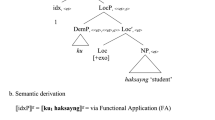Abstract
Both context relativists and circumstance-of-evaluation relativists agree that the traditional semantic interpretation of some sentence-types fails to deliver the adequate truth-conditions for the corresponding tokens. But while the context relativists argue that the truth-conditions of each token depend on its context of utterance—each token being thus associated with a distinct intension—circumstance-of-evaluation relativists preserve a unique intension for all the tokens by placing circumstances of evaluations under the influence of a certain ‘point of view’. The main difference between the two approaches is that only the former can operate locally. It is shown that, for this reason, circumstance-of-evaluation relativism makes erroneous semantic predictions about (relative) gradable adjectives.
Similar content being viewed by others
References
Bach K. (1994) Conversational impliciture. Mind and Language 9: 124–162
Bach K. (1999) The myth of conventional implicature. Linguistics and Philosophy 22: 327–366
Bach K. (2005) Context ex machina. In: Szabó Z. G. (eds) Semantics versus pragmatics. Oxford University Press, Oxford, pp 15–44
Bach K. (2006) The excluded middle: Semantic minimalism without minimal propositions. Philosophy and Phenomenological Research 73(2): 435–442
Barwise J., Perry J. (1983) Situations and attitudes. MIT Press, Cambridge, MA
Blakemore D. (1987) Semantic constraints on relevance. Blackwell, Oxford
Cappelen H., Lepore E. (2005) Insensitive semantics. A defense of semantic minimalism and speech act pluralism. Blackwell, Oxford
Carston R. (2002) Thoughts and utterances. The pragmatics of explicit communication. Blackwell, Oxford
Glanzberg M. (2007) Context, content, and relativism. Philosophical Studies 136: 1–29
Kaplan D. (1989) Demonstratives. In: Amog J., Perry J., Wettstein H. K. (eds) Themes from Kaplan. Oxford University Press, Oxford, pp 481–563
Kennedy C. (2007) Vagueness and grammar: The semantics of relative and absolute gradable adjectives. Linguistics and Philosophy 30(1): 1–45
Kissine M. (2007) The fallacy of semantic minimalism. Facta Philosophica 19: 23–35
Lewis D. K. (1979) Scorekeeping in a language game. Journal of Philosophical Logic 8: 339–359
MacFarlane J. (2005) Making sense of relative truth. Proceedings of the Aristotelian Society 105: 321–339
MacFarlane J. (2007a) Relativism and disagreement. Philosophical Studies 132(1): 17–31
MacFarlane J. (2007b) Semantic minimalism and nonindexical contextualism. In: Preyer G., Peter G. (eds) Context-sensivity and semantic minimalism: New essays on semantics and pragmatics. Oxford University Press, Oxford, pp 240–250
MacFarlane J. (2009) Nonindexical contextualism. Synthese 166: 231–250
McCawley J. D. (1981) Everything that linguists have always wanted to know about logic: but were ashamed to ask. Basil Blackwell, Oxford
Merchant J. (2004) Fragments and ellipsis. Linguistics and Philosophy 27: 661–738
Montminy M. (2006) Semantic content, truth conditions and context. Linguistics and Philosophy 29: 1–26
Potts C. (2005) The logic of conventional implicatures. Oxford University Press, Oxford
Predelli S. (2005) Painted leaves, context, and semantic analysis. Linguistics and Philosophy 28: 351–374
Recanati F. (1996) Domains of discourse. Linguistics and Philosophy 19: 445–475
Recanati F. (2004) Literal meaning. Cambridge University Press, Cambridge
Recanati F. (2007) Perspectival thought. A plea for (moderate) relativism. Oxford University Press, Oxford
Soames S. (1986) Incomplete definite descriptions. Notre-Dame Journal of Formal Logic 27: 349–375
Soames S. (2002) Beyond rigidity: The unfinished semantic agenda of ‘Naming and Necessity’. Oxford University Press, Oxford
Stainton R. J. (1997) What assertion is not. Philosophical Studies 85: 57–73
Stainton R. J. (1998) Quantifier phrases, meaningfulness in isolation, and ellipsis. Linguistics and Philosophy 21(3): 311–340
Stainton R. J. (2005) In defense of non-sential assertion. In: Szabó Z. G. (eds) Semantics versus Pragmatics. Oxford University Press, Oxford, pp 383–457
Stanley J. (2000) Context and logical form. Linguistics and Philosophy 23(4): 391–434
Stanley J. (2002) Maiking it articulated. Mind and Language 17(1–2): 149–168
Stanley J. (2004) On the linguistic basis for contextualism. Philosophical Studies 119: 119–146
Szabó Z. G. (2001) Adjectives in context. In: Harnish R. M., Kenesei I. (eds) Perspectives on semantics, pragmatics, and discourse. John Benjamins, Amsterdam, pp 119–146
Author information
Authors and Affiliations
Corresponding author
Additional information
Preliminary versions of this paper have been delivered at the 10th IPrA conference, Göteborg (2007), and at the Conference on Context-dependence, perspective and relativity in language and thought, ENS, Paris (2007); I’m grateful to both audiences for useful feedback. I also benefited from detailed comments and criticisms on a previous written version from Marc Dominicy and two anonymous reviewers. Philippe De Brabanter’s patient and insightful remarks are far too numerous to be acknowledged in footnotes; this should not prevent the usual disclaimer from applying. My research is supported by a post-doctoral researcher grant from the Fonds de la Recherche Scientifique de la Communauté Française de Belgique (F.R.S.-FNRS).
Rights and permissions
About this article
Cite this article
Kissine, M. From contexts to circumstances of evaluation: is the trade-off always innocuous?. Synthese 184, 199–216 (2012). https://doi.org/10.1007/s11229-010-9732-4
Received:
Accepted:
Published:
Issue Date:
DOI: https://doi.org/10.1007/s11229-010-9732-4



